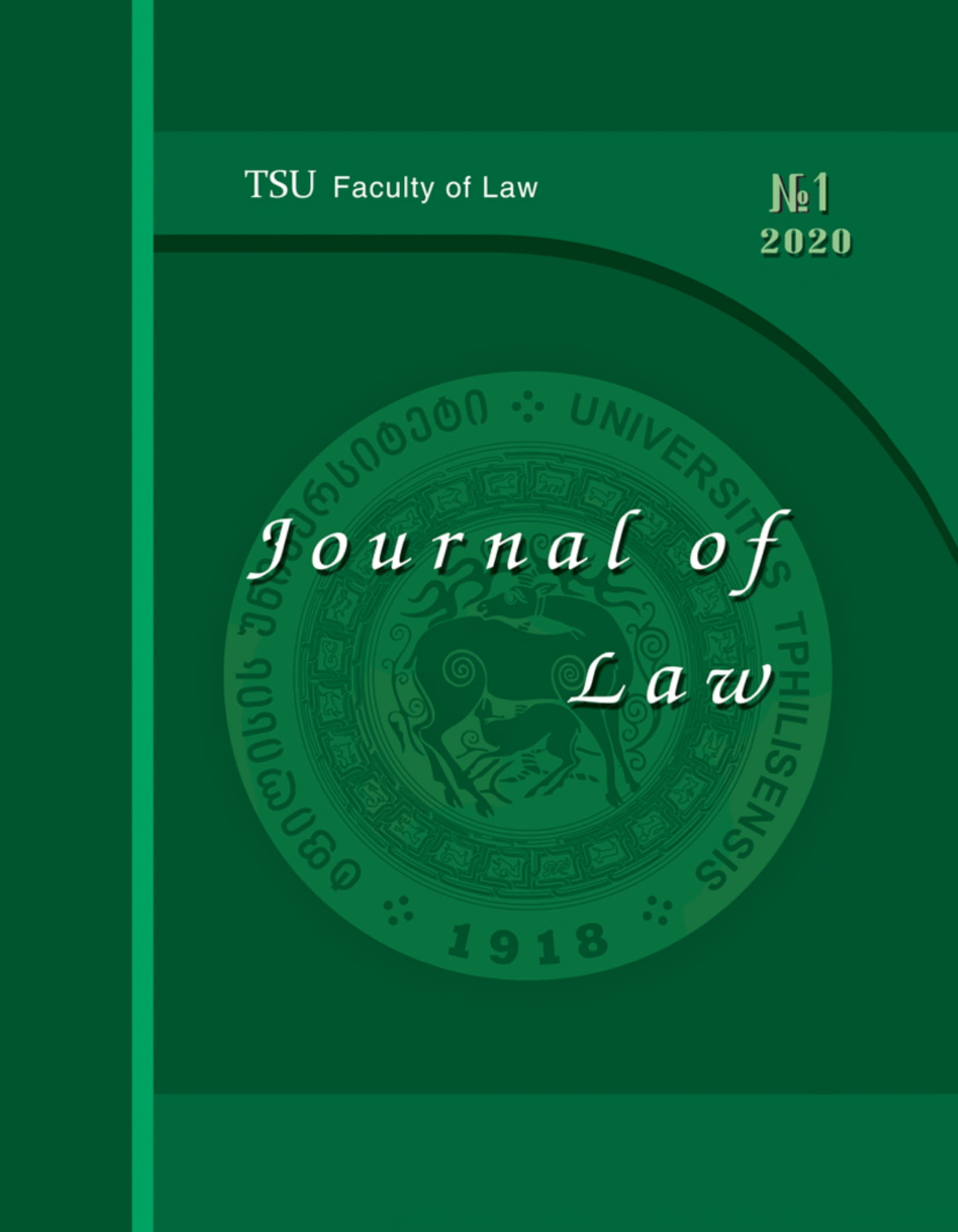Legal Grounds and Factual Preconditions for the Reinstatement of Unlawfully Dismissed Public Officer
Keywords:
Unlawfully dismissed public officer; Public officer reinstatement; Principle of “primo in tempore, potior in iure”; Principle of legitimate expectations; Restitution of officer’s rightsAbstract
The legal instrument for reinstating an unlawfully dismissed public officer has been stipulated by Article 118 of the Law of Georgia on Public Service. In case the decision to dismiss the officer is declared null and void, the rule lays down consecutive procedures and establishes guarantees of legal protection.
Dictated by existing normative regulations, following the nullification of the decision on dismissal of the officer, the public authority shall be liable to immediately reinstate the servant to the same position and if such appointment does not exist – to an equivalent position at the same office or, failing that, in the public service system at large. If reinstatement is ultimately impossible, then the officer shall be enrolled in the reserve and granted compensation.
The detailed legislative regulation of the issue should have prevented varied implementation of the norm in practice, however court decisions have highlighted different approaches, in certain cases pertaining to the labor rights of other public officers and thus necessitating scientific analysis
References
Constitutional Law of Georgia – On the Amendment of the Constitution of Georgia, № 1324-RS, LHG, 19/10/2017.
Resolution № 199 of the Government of Georgia, of April 20th, 2017, on the Rules of Mobility of Professional Public Officers, LHG, 21/04/2017.
Resolution № 627 of the Government of Georgia, of November 19th, 2014, on Approval of the Concept of Public Office Reforms and on Certain Measures Pertaining Thereto, LHG, 20/112014.
Law of Georgia on Public Service, LHG, 11/11/2015.
Administrative Procedure Code of Georgia, LHG, 39(46), 06/08/1999.
General Administrative Code of Georgia, LHG, 32(39), 15/07/1999.
Battis U., Allgemeines Verwaltungsrecht, 3. Aufl. Heidelberg, 2002, 179.
Berger L, An Analysis of the Doctrine That "First in Time is First in Right", Nebraska Law Review, Vol. 64, Issue 3, 1985, 350, 354.
Fleiner T., Fleiner L. R. B., Constitutional Democracy in a Multicultural and Globalised World, Verlag, Berlin, Heidelberg, 2009, 259-260.
Goodin R. E., Compensation and Redistribution, Nomos, Vol. 33, Compensatory Justice, 1991, 143.
Hoog L. M., De prioriteitsregel in het vermogensrecht, Bodegraven, 2018, 261, 265, https://openaccess.leidenuniv.nl/handle/1887/66890[20.04.2020].
Kopp O. F., Ramsauer U., Verwaltungsverfahrensgesetz – Kommentar, 17. vollstaendig ueberarbeitetet Aufl., München, 2016, 49-30.
Khubua G., Legal Theory, 2nd Ed., Tbilisi, 2015, 159-160 (in Georgian).
Khubua G., Legal Theory, Tbilisi, 2004, 43-44 (in Georgian).
McKinnon T., The Doctrinal Foundations of Legitimate Expectations, 2013, 7, https://www.academia.edu/4841134/Thoughts_on_the_Doctrinal_Foundations_of_Legitimate_Expectations [26.04.2020].
Muthorst O., The Foundations of Law: Method, Definition, System, Maisuradze D. (trans.), Miminoshvili M. (ed.), Tbilisi, 2019, 281, 283 (in Georgian).
Potestà M., Legitimate expectations in investment treaty law: Understanding the roots and the limits of a controversial concept, 7, <https://lk-k.com/wp-content/uploads/potesta-legitimate-expectations-inv.-treaty-law-2013.pdf> [26.04.2020].
Rennert K., The Protection of Legitimate Expectations under German Administrative Law Paper given on the occasion of the seminar on the protection of legitimate expectations of the Association of Councils of State and Supreme Administrative Jurisdictions of the European Union (ACA-Europe) on 21 April 2016 in Vilnius, Lithuania, https://www.bverwg.de/medien/pdf/rede_20160421_vilnius_rennert_en.pdf [26.04.2020].
Seerden R., Stroink F., Administrative Law of the European Union, Its Member States and the United States: A Comparative Analysis, Antwerpen – Groningen, 2002, 119.
Schlieffen K., Haass S., Grundkurs Verwaltungsrecht, Paderborn, Deutschland, 2019, 55.
Schmidt R., Allgemeines Verwaltungsrecht, 16. Aufl. Grasberg bei Bremen, 2013, 57.
Turava P., Pirtskhalaishvili A., Dvalishvili M., Tsulaia I., Kardava E., Sanikidze Z., Makalatia G., The Law of Georgia on Public Service: Commentary, Kardava E. (ed.), Tbilisi, 2018, 43-45 (in Georgian).
Turava P., General Administrative Law, 2nd Ed., Tbilisi, 2018, 122 (in Georgian).
Wolff H. J., Bachof O., Stober R., Verwaltungsrecht I, 10. Aufl. München, 1994, 745.
Zippelius R., Theory of Legal Methods, 10th Ed., GIZ, Tbilisi, 2009, 122 (in Georgian).
Decision № 3B/1195-19 of the Court of Appeals of Tbilisi, of October 16th, 2019.
Decision № BS-944(K-19) of the Supreme Court of Georgia, of October 10th, 2019.
Decision № BS-595-595(2K-18) of the Supreme Court of Georgia, of April 17th, 2019.
Decision № BS-376-376(2K-18) of the Supreme Court of Georgia, of December 11th, 2018.
Decision № 2/4/735 of the Constitutional Court of Georgia, of July 21st, 2017, “Citizens of Georgia – Meri Giorgadze and Pikria Merabishvili vs Parliament of Georgia”.
Decision № 2/3/630 of the Constitutional Court of Georgia, of July 31st, 2015, “Citizen of Georgia – Tina Bezhitashvili vs Parliament of Georgia”.
Decision № 1/2/569 of the Constitutional Court of Georgia, of April of 11th, 2014, “Citizens of Georgia – Davit Kandelaki, Natalia Dvali, Zurab Davitashvili, Emzar Goguadze, Giorgi Meladze and Mamuka Pachuashvili vs Parliament of Georgia”.
Pierson v. Post, Supreme Court of New York, 3 Cai. R. 175 Supreme Court of New York, http://www.courts.state.ny.us/reporter/archives/pierson_post.htm [24.04.2020].
Downloads
Published
How to Cite
Issue
Section
License

This work is licensed under a Creative Commons Attribution-ShareAlike 4.0 International License.









